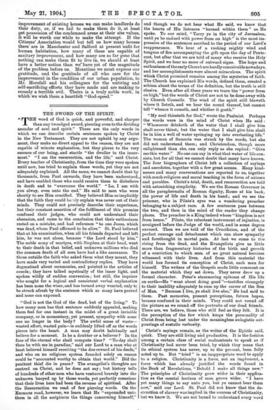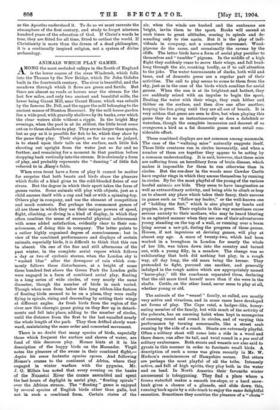obsession, and came to the conclusion that their enthusiasm rested
on a mistake, and had reference "to one Jesus, which was dead, whom Paul affirmed to be alive." St. Paul believed that at his examination, when all his friends departed and left him, he was not alone, because "the Lord stood by him." The noble army of martyrs, with Stephen at their head, went to their death in that belief, and unknown millions who died the common death of all men have had a like assurance. To those outside the faith who asked them what they meant, they have made very varied and contradictory replies. They have dogmatised about ceremonies, and pointed to the articles of creeds ; they have talked mystically of the inner light, and spoken wildly of sudden conversion ; but still, the inquirer who sought for a logical and consistent verbal explanation has been none the wiser, and has turned away wearied, only tc be struck afresh by the sentence which so many have proved and none can expound.
"God is not the God of the dead, but of the living." To how many men has that sentence suddenly appealed, making them feel for one instant in the midst of a great invisible company, or in momentary, yet present, sympathy with some one no longer in the body ? The awful sense of waste— wasted effort, wasted pain—is suddenly lifted off as the words pierce into the heart. A man may doubt habitually and believe for a moment. Is he a doubter or a believer? In the face of the eternal who shall compute time ? "To-day shalt thou be with me in paradise," said otir Lord to a man who at least believed himself receiving "the due reward of his deeds," and who on no religious system founded solely on reason could be "accounted worthy to obtain that world." Did the penitent thief die in peace? The evangelist's thoughts are centred on Christ, and he does not say ; but history tells of hundreds of other men who have ventured bravely into the unknown buoyed up by those words, yet perfectly conscious that their lives here had been the reverse of spiritual. After the Resurrection we read of few piercing words. On the Emmaus road, however, we learn that He "expounded unto them in all the scriptures the things concerning himself," and though we do not hear what He said, we know that the hearts of His listeners "burned within them" as He spoke. To our mind, "Tarry ye in the city of Jerusalem, until ye be endued with power from on high" is the most im- pressive of the sentences ascribed to the period of our Lord's reappearance. We hear of a rushing mighty wind and tongues of fire accompanying the gift upon the day of Pente- cost, but after that we are told of many who receive the Holy Spirit, and we hear no more of outward signs. The hope and enthusiasm of the early Church are hardly conceivable nowadays, and her accomplishments were almost miraculous. The spirit which Christ promised remains among the mysteries of faith. The Church has explained His words, defined them, created a schism about the terms of the definition, but the truth is still elusive. Even after all these years we trace the "power from on high," but the words of Christ are not to be done away with by Church Councils. The wind of the spirit still bloweth where it listeth, and we hear the sound thereof, but cannot tell "whence it cometh, and whither it goeth."
"My soul thirsteth for God," wrote the Psalmist. Perhaps the words were in the mind of Christ when He said : "Whosoever drinketh of the water that I shall give him shall never thirst; but the water that I shall give him shall be in him a well of water springing up into everlasting life." The woman of Samaria was struck by the words, but she did not understand them ; and Christendom, though more enlightened than she, can only reply as she replied : "Give me this water." No one can say in what that water of life con- sists, but for all that we cannot doubt that many have known. The four biographers of Christ left a collection of sayings and anecdotes, together with a few great scenes. Many kind- nesses and many conversations are reported to us, together with much religious and moral teaching in the form of axioms and parables. Christ's trial, death, and resurrection are told with astonishing simplicity. We see the Roman Governor in all the paraphernalia of Roman dignity, Rome at his back, the power of life and death in his hand; and we see the prisoner, who in Pilate's eyes was a wandering preacher belonging to a subject race. A few sentences pass between the two, and then in the mind of the reader they change places. The preacher is a King indeed whose "kingdom is not from hence." Pilate, the reluctant instrument of injustice, is arraigned before the Judge of the world, and in some degree excused. Then we are told of the Crucifixion, and of the perfect courage and detachment which can show sympathy and forethought in mortal pain. At last we come to the rising from the dead, and the Evangelists give us little more than fragmentary histories of the birth and growth of a conviction to which men of no great natural heroism witnessed with their lives. And from this material the world has formed its conception of Christ, each man for himself. The writers of the Gospels made little comment on the material which they set down. They never drew up a formal character. Peter's stammering epitome of His life on earth—He "went about doing good "—testifies strangely to their inability adequately to sum up the career of the Son of Man "Because I live, ye shall live also," He bad said to them. Past memories, present perceptions, future hopes, became confused in their minds. They could not round off the picture as we round off the portraits of our dead friends. There are, we believe, those who still feel as they felt. It is the perception of the few which keeps the personality of Christ from being lost under the meaningless eulogistic out- pourings of ecstatic verbosity.
Christ's sayings remain, as the writer of the Epistle said, quick. They are still living and productive. It is the fashion among a certain class of social malcontents to speak as if Christianity had never been tried, by which they mean that its ethical system has never, up to the present, been fully acted up to. But " tried " is an inappropriate word to apply to a religion. Christianity is a force, not an implement, a force which has already justified the words found in the Book of Revelations, "Behold I make all things new." The principles of Christianity grow wider in their applica- tion as the mental horizon of man grows wider. "I have yet many things to say unto you, but ye cannot bear them now," said our Lord. St. Paul did not know that the de- struction of slavery was implied in the success of Christianity, but we know it. We are not bound to understand every word Ms the Apostles understood it. To do so we must recreate the atmosphere of the first century, and study to forget nineteen hundred years of the education of God. If Christ's words be true, they are fitted for all time, fitted to outlast the world. If Christianity is more than the dream of a dead philosopher, it is a continually inspired religion, not a system of divine archaeology.
ANIMALS WHICH PLAY GAMES.



































 Previous page
Previous page